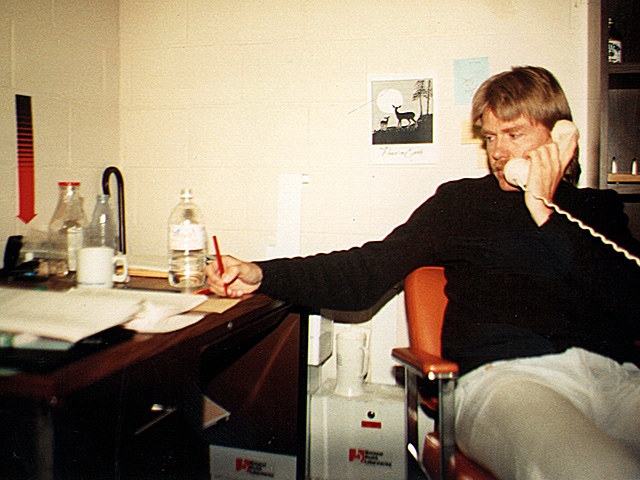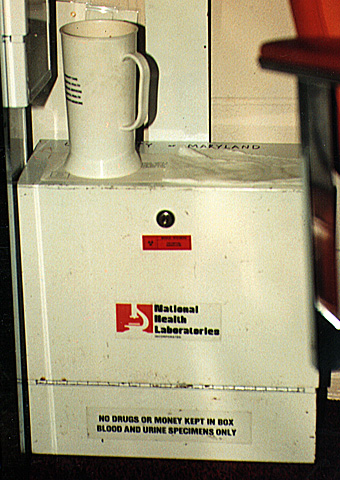Conversation with Dan Calvin, UMCP Urine Czar
I walked into the University of Maryland Health Center, and asked to have
my urine tested for drugs. I was refered to Dan Calvin, Urine Czar, who
is in charge of the administration of urine tests.
These are my notes from a discussion I had with Dan Calvin on April 16.
The lines prefixed by [ ]'s are questions I still want answered.
Dan A. Calvin
Urine Czar
University of Maryland Health Center
(301) 314-8104
dcalvin@umdacc.umd.edu

I asked if the University of Maryland Health Center would give me a urine
test to screen for drugs.
He asked why I wanted it.
I honestly said that I wanted the Health Center to administer a test, because
I had to take another test as a condition for employment, and it was very
important for me to pass that test.
He said that there was a policy of not testing students who volunteered
to be tested, because some of them just wanted to know if they were clean
for other tests they were required to take.
I said that the University of Maryland drug abuse information pamphlet that
I read said that some students voluntarily request testing, and that I understood
it to mean that I could ask for a test and get it.
He said that I had to be enrolled in a drug treatment program, and that
the counselor would have to decide if testing was necessary.
I said that I wouldn't be here asking to have my urine tested, if I needed
to be enrolled in a treatment program, and that I thought I had at least
as much of a right to know what chemicals were in my own urine, as did my
potential employer.
[ ] I want to see the written policy on this matter. What is the reason
for the policy? Under what conditions are students who voluntarily request
testing administered tests? Why is it mentioned in the pamphlet?
From the pamphlet:
"Drug Testing
The service is available for students who are currently participating in
some type of alcohol or drug abuse intervention program in the Health Center,
or elsewhere. Sometimes students voluntarily request testing, and sometimes
it is requested by the Office of Judicial Programs, probation officers,
attorneys at law, etc. The urine collection and chair-of-custody [sic] procedures
prevent tampering of samples. Highly reliable confirmatory tests are relied
upon. The student incurs the cost of the test ($25.00 to $125.00) in all
cases. For more information about drug testing call 454-6817."
I put a note into the suggestion box asking for the phrase "Sometimes
students voluntarily request testing" to be omitted or qualified.
He claimed that the University of Maryland employees who did not sign a
piece of paper saying they wouldn't do illict drugs were fired.
I said that I had talked to several people [including a graduate student,
a professor, and a dean] who all worked for the university and refused to
sign the paper, and they were still working for the university.
He said I didn't know how many people signed it, how many refused to sign
it, and how many were fired. He said that my statistical sample was very
small and that he expected a computer science major to know statistics better
than that.
I said that as far as I knew, those people who refused to sign were still
working for the University. I had discussed it quite recently with the professor
and the dean, and neither of them mentioned being fired. Even though it
took me three tries to pass statistics, at least I knew enough about logic
to see that there was something wrong about what he was telling me. I asked
whether they only fired *some* of the people who didn't sign. How did they
discriminated against the people who they fired for not signing, and why
they didn't fire other people for not signing?
He said some of the people were fired and hired right back again.
Why didn't he tell me that in the first place, I asked. Didn't that vindicate
the people who refused to sign because it was an invasion of their privacy?
[ ] I want a copy of the paper people were asked to sign.
[ ] I want a chance to refuse to sign it myself, since I am a University
of Maryland employee, but was never given the paper.
[ ] I want to know how many people signed, how many did not sign, how many
were fired, how many were re-hired.
[ ] Exactly why were the people re-hired? Were all of them re-hired?
[ ] Will the University try to make people sign such a paper in the future?
Will they fire people for refusing to sign the paper?
He said that a bill had just been passed that would require companies to
do random drug testing.
I said that if he was refering to the Drug Free Workplace Act of March 1989,
then the Xerox drug testing consent form explicitly stated that "The
Act does not require Xerox to drug test."
He said he had a copy of the Drug Free Workplace Act, and that even though
Xerox was only testing new employees now, they would be required to do random
testing because of a law that was now on the books.
I asked if it was the Drug Free Workplace Act of March 1989 that required
random testing, and he did not say.
[ ] I want a copy of the act that would force companies to perform random
testing, as well as a copy of the Drug Free Workplace Act of March 1989
(if they are different acts).
He asked me if I knew what the cost of drug use to society was.
I told him that I was familiar with the claims that President Bush was making,
because I had just read a Scientific American article about it [Scientific
American, March 1990, pp. 18-22]. I read him an excerpt from the article,
which told how the incredibly inflated statistical figure of $60 to $100
billion in lost productivity due to drug use was bogusly computed, and how
there was no significant difference in workplace performance of people who
test postitive or negative for drugs.
According to the head of the NIDA study, Henrick Harwood, there was no significant
difference between the income of households with current users of any illegal
drug -- including marijuana, cocaine and heroin -- and the income of otherwise
similar households. Harwood, who now have a nice job with the White House,
had to admit that, "you would be safe saying that [current use of even
hard drugs -- as opposed to perhaps a single marijuana binge in the distant
past -- does not lead to any ``loss'']."
Dan Calvin kept trying to interrupt me, to keep me from reading the article
to him. He said he had a copy of the NIDA study, but he did not care to
have a copy of the Scientific American article.
I said I thought it was his job to know about these things.
[ ] I want a copy of the NIDA study.
I told him that I have been told by many Xerox PARC employees that they
would walk, if Xerox instituted random drug testing.
He said he didn't think they would, that people just talk a lot and never
acted on what they believe. He said that Xerox could just hire more people.
I said that the people at PARC could not be replaced. I said that were I
in their position, threatened with random drug testing, (which I very well
could be, were I to take the job), I would walk myself, since I know I could
easily get another good job at a company that did not test.
He said that I was lying.
[ ] I want to know exactly what I said that he thinks was a lie.
He said that for somebody who was into computers, my logic was very faulty.
I said that this sentence is a lie. I asked him if I was lying just then.
He said that I was using the same tactics as the anti-drug campaigns.
I asked just what those tactics were, and how does he justify the anti-drug
campaign's use of them? And why does he think that only one side should
be able to use those tactics?
I asked if he respected the moral position I would be taking, by submitting
to the drug test, but refusing to take the job.
He said he did not.
[ ] I want to know what he suggests I do in this situation? What actions
on my part would earn his respect?
He said that whatever I did, it would only be a drop in the bucket, and
wouldn't mean anything.
I said that at least it would be a drop in the right bucket.


